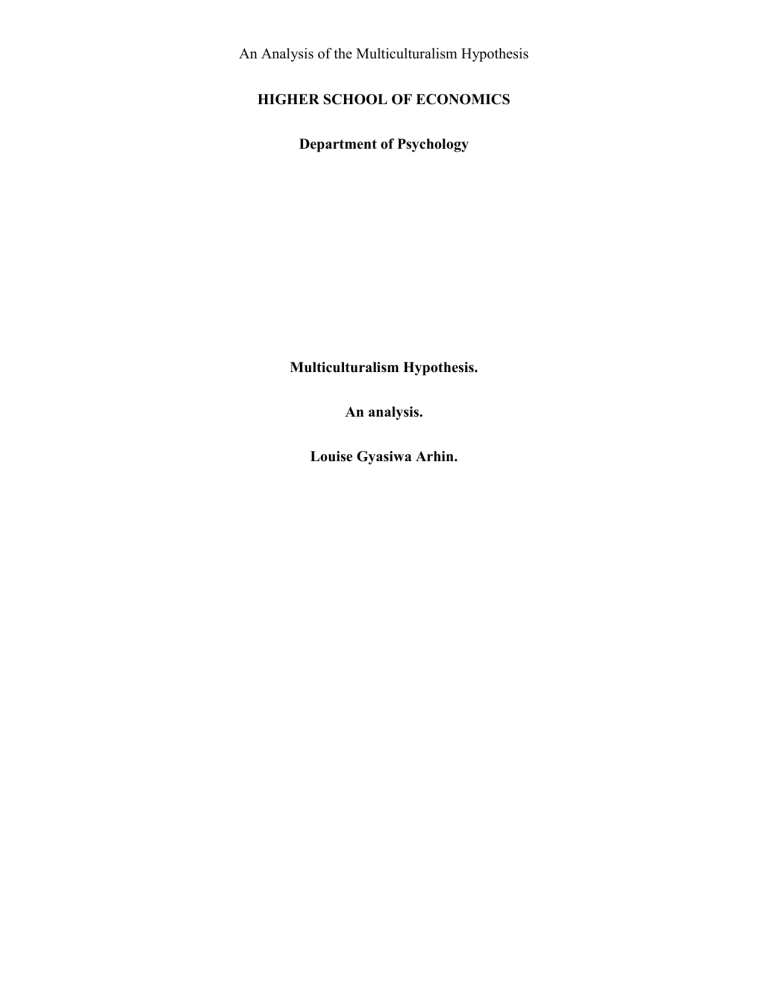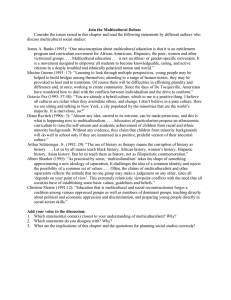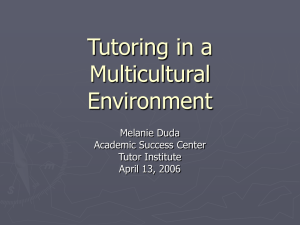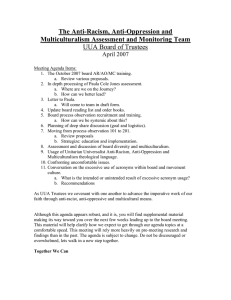
An Analysis of the Multiculturalism Hypothesis HIGHER SCHOOL OF ECONOMICS Department of Psychology Multiculturalism Hypothesis. An analysis. Louise Gyasiwa Arhin. An Analysis of the Multiculturalism Hypothesis Introduction In an increasingly globalized world where plural societies are the norm rather than the exception, all countries will eventually grapple with the reality of ethno-cultural pluralism (Teng & Leong, 2018) and as such Multiculturalism has become an increasingly common characteristic of contemporary societies and in culturally diverse social contexts almost every person experiences intercultural contact on a daily basis (Berry, 2016). Due to the increase in migration, many western countries are having to rethink their approach to citizenship because these migrants often retain close ties with their country of origin (Kymlicka, 2003). According to Kymlicka (2003) while some commentators argue that in the world of migration, a national identity is no longer relevant and that a new way of assigning rights and responsibilities will be more fruitful; others argue that the increasing ethnic and religious diversity within modern states requires an effort by the state to create and sustain a sense of common national identity. Berry (2011) describes two visionary models of intercultural relations and acculturation in plural societies – melting point where there is one dominant society as practiced in France and the USA and the multicultural model where there is a larger society that accommodates the interest and needs of the numerous cultural groups, and which are fully incorporated as ethno cultural groups rather than minorities. Canada, a country which has seen lots of migration and has many diverse ethno cultural groups, adopted the latter option, a multicultural policy in 1971 under Prime Minister Trudeau and this policy identified programmes including ones for Multicultural Grants, Culture Development, Ethnic Histories, Canadian Ethnic Studies, Teaching of Official Languages, and Federal Cultural Agencies among others (Guo & Wong, 2015). It is also from this policy that a multicultural hypothesis was derived. An Analysis of the Multiculturalism Hypothesis Multiculturalism Hypothesis – Viewpoint 1. The multicultural hypothesis by Berry, Kalin and Taylor (as cited in Teng & Leong, 2018) states that when an individual feels secure in his/her economic livelihood and socio-cultural identity, it will lead to being more accepting of other groups and so encourage a more positive intergroup relation. In contrast, threats to or the lack of economic and cultural security will result in negative attitudes and intergroup hostility. Empirical support for the multiculturalism hypothesis According to Berry (2011), there is now substantial evidence to support this hypothesis. In a research examining intercultural relations in the Republic of North Ossetia-Alania (RNO-A) by Galyapina & Lebedeva (2016), the multiculturalism hypothesis was tested. They discovered that RNO-A is the most favorable place for Russians living in the North Caucasus because attitudes toward the Russian minority are not discriminatory. With a sample of 318 Ossetians and 327 Russians and using SEM, Galyapina & Lebedeva (2016) found results consistent with the multiculturalism hypothesis, the levels of support for multicultural ideology and tolerance among the Ossetians could be predicted by their perceived security (.44 and .32 respectively). In addition, perceived security among the Ossetians positively and significantly affected their acculturation expectation of integration (.49). This result supports the multiculturalism hypothesis because the Ossetians and the Russians, who had a strong mutual perceived security, preferred the integration but not the assimilation strategy (Galyapina & Lebedeva, 2016). In another study measuring the intercultural relations in Russia and Latvia, Lebedeva, Tatarko & Berry (2016) tested the multiculturalism hypothesis with two dominant groups - Russian Muscovites and Latvians in Riga - and two non-dominant groups - migrants from the Caucasus in Moscow and the Russian minority in Riga. Results showed that the higher the perceived security, the higher are the support of An Analysis of the Multiculturalism Hypothesis multicultural ideology and ethnic tolerance (for both the minority group and the members of the larger society). For both samples in Moscow, higher perceived security predicted higher levels of ethnic tolerance while for the two samples in Riga, higher perceived security was seen for both the dominant and the Russian minority groups even though the result was only significant for the dominant group. More empirical support for this hypothesis can be seen from a research conducted by Ward and Masgoret (2008) in New Zealand examining attitudes toward immigrants and immigration policy. Ward & Masgoret (2008) measured a variety of ideas including multicultural ideology, perceived threat (symbolic, realistic and zero – sum) and acculturation expectations. The findings revealed that New Zealanders strongly endorse a multicultural hypothesis with 89% agreeing that it is a good thing for a society to be made up of people from different races, religions and cultures. According to Ward & Masgoret (2008) on the whole attitudes towards immigrants were positive. The researches described above confirm the result of two national surveys carried out in Canada by Berry and others in 1977 and 2000 (as cited in Berry, 2016) that created measures of cultural security/threat and economic security/threat with respect to extant diversity and the continuing flow of immigration. Cultural security was negatively correlated with ethnocentrism, and positively with multicultural ideology and with perceived consequences of multiculturalism. Economic security had a similar pattern of correlations with these variables. From the empirical evidence presented above, it is possible to conclude that security in one’s own identity predicts the possibility of accepting “others” … (Berry, 2016). Viewpoint 2 Other researchers posit that integration (one identity) rather than multiculturalism will promote positive intergroup relations and conversely reduce intergroup hostility (Koompmans, 2009). An Analysis of the Multiculturalism Hypothesis Evidence from empirical studies. A huge backlash has risen against multiculturalism especially from countries which have practiced multiculturalism for a while. Multiculturalism is blamed for the residential ghettoization and social isolation of immigrants; poor economic integration of immigrants; poor educational outcomes for their children; high dependence on welfare; the perpetuation of illiberal practices amongst immigrant groups, often involving restricting the rights and liberties of girls and women; political radicalism, especially among Muslim youth among other (Banting & Kymlicka, 2013). Also, the Netherlands, long regarded as an exemplary case of successful multiculturalism is now regarded as a prime example of the failure of such policies; an example of how multiculturalism can lead to socioeconomic marginalization occurred when local authorities denied social welfare benefits to a woman wearing full facial covering stating that it was impossible for colleagues and customers to see her face which made her unemployable (Koompmans, 2009). A research was conducted by Koompmans (2009) to investigate how multiculturalism policies and welfare-state regimes have affected the socio-economic integration of immigrants of eight European countries: Germany, France, the United Kingdom, the Netherlands, Switzerland, Sweden, Austria and Belgium. The researcher measured residential segregation in the eight European countries and hypothesized that residential segregation of immigrants will be more pronounced in countries with multicultural integration policies such as the Netherlands, Sweden, the UK and Belgium, and less pronounced in countries that put more emphasis on the assimilation of immigrants to the majority culture - Austria, Germany, France and Switzerland. Findings revealed a connection between multicultural integration policies and social segregation, as suggested by the high levels of residential segregation found in Belgium, Sweden, the Netherlands and the UK even though it was more pronounced among immigrants with Muslim backgrounds. An Analysis of the Multiculturalism Hypothesis There is the assumption that in countries that practice multiculturalism there would be positive intergroup contact and from this it can be assumed that there would be less crime especially among immigrants. Koompmans (2009) however found the opposite, overrepresentation of inmates from an immigrant background was the strongest in the Netherlands (among the countries investigated, it was the one which practiced the strongest form of multiculturalism) where foreign born prisoners made 53% of the prison population as compared to the UK where foreigners and racial minorities made up 18%. Koompmans (2009) concluded his investigations by stating that the eight countries he investigated adopted different forms of integration or multiculturalism policies with Netherlands adopting and practicing the strongest multiculturalism, however, taking the Dutch results of whether state-sponsored multiculturalism is a successful recipe for the integration of immigrants provides dismal evidence. From the multicultural hypothesis, the Netherlands should have been comparatively successful in solving problems of integration and combating exclusion and segregation, on the contrary, the Netherlands is faced with low labour market participation, strong segregation and comparatively high levels of crime among immigrants. The Netherlands shares these disappointing integration outcomes with two countries that have followed a similar integration philosophy, Sweden and (particularly the Flemish part of) Belgium. The final empirical evidence I would give against the multicultural hypothesis is a research conducted by Verkyuten (2008) investigating support for multiculturalism and minority rights in ethnic Dutch citizens. Study 1 examined the relationships among national identification, out-group threat, and support for multiculturalism among a sample of Dutch adolescents. Results showed stronger national identification predicted reduced support for multiculturalism mediated by increases in out-group threat. Thus, national identification is associated with higher out-group An Analysis of the Multiculturalism Hypothesis threat and, via threat, to more strong rejection of multiculturalism. Study 2 attempted to generalize the findings from the first study but the emphasis was on immigrants and ethnic minorities more generally and whether participants supported their cultural recognition and rights. Results showed that national identification and out-group threat were negatively associated with support for multiculturalism. In study 3, Verkyuten (2008) investigated whether these findings generalize to an older sample by analyzing data collected among a national sample of Dutch adults. In this study the focus was on participants’ endorsement of equal rights of immigrants and ethnic minority groups and also on the authoritarian personality. In agreement with self-categorization theory, it was found that perceived out-group threat mediated the relationship between national identification and, this time, support for equal rights for immigrants and ethnic minority groups while authoritarianism had an independent positive effect on perceived out-group threat and a negative effect on the support for equal rights. An Analysis of conflicting views (Pros & Cons). Migration is a phenomenon which has come to stay and many countries have diverse ethno cultural groups. The question here is if these groups should maintain their own identity or adopt the culture of the host or dominant group. Proponents of the multicultural hypothesis posits that confidence in one’s identity will lead to sharing, to respect for others and to the reduction of discriminatory attitudes. The case of Canada is held up as a model of how multiculturalism can be successfully implemented and even though that is true it is argued that multiculturalism was adopted in Canada as a response to the agitations of the Quebecois who wanted their own national state. Also, not all ethno cultural groups especially the indigenous peoples accept multiculturalism; they often prefer maintaining themselves as distinct peoples and often want their lands and cultures protected. Many national minorities like the Catalans or the Flemish want have a strong sense of An Analysis of the Multiculturalism Hypothesis identity but fight to maintain their own public institutions, operating in their own national language and culture (Kymlicka, 2002), in this case a strong sense of identity does not lead to improve intergroup prejudice but increases it as that identity wants to be maintained. On the other hand, critics of multiculturalism argue that it has led to separatism and the inability of immigrant groups to successfully acculturate in their new country. The UK faces this problem especially as many immigrants have communities of their own and do not fully interact with the larger society. Unfortunately, recent terrorist attacks mostly by second and third generation immigrants (e.g. 2005 London terrorist bombings by British – bred immigrants, 2017 Manchester Arena bombings, 2017 Westminster attack) have not helped the case for multiculturalism. However, supporters of multiculturalism argue that countries like the UK and France practice a kind of multiculturalism which is distinctively different from that practiced by Canada. The kind practiced by France and the UK has led to exclusion and marginalization rather than integration and a respect for cultures of immigrant groups. Conclusion In my opinion, empirical evidence abounds on the positive effects of multiculturalism. What more as an African, I live in a multicultural society where ethno cultural identities are respected but a national identity is also shared. I realize however that Africa’s multicultural climate is radically different from that of European and Western countries because of its quite homogeneous nature. European and Western countries on the other hand have to deal with race, religion, political ideologies among others. Nonetheless, the importance of the multicultural hypothesis which encourages economic and socio –cultural identity in promoting positive intergroup relations cannot be underestimated. According to Alexander (2013) the second world war was fueled on racial and religious terms which promoted among other things ‘internal’, intra- An Analysis of the Multiculturalism Hypothesis national genocidal campaigns against entire categories of people, Jews, Slavs, and Romani, homosexuals and the disabled. This led not only to the formation of the European Union but perhaps the acceptance of a multicultural policy which respected the unique identities of individuals. Finally, for the multiculturalism hypothesis to work effectively, certain conditions must be met. In the special issue “Multiculturalism and Intercultural Relations: A Comparative Analysis”, Berry (2016) states that multiculturalism hypothesis will be effective if equal participation, diversity and equity are present. He says “A view of multiculturalism that considers only the existence of cultural diversity may lead to the emergence of separate cultural groups within a diverse society. Diversity without equal participation will lead to separation or segregation; equal participation without diversity will result in assimilation or the pursuit of the melting pot. In the absence of diversity and equity, marginalization and exclusion will likely occur, but when both diversity and equity are present, integration and multiculturalism are found”. I agree with this view. References Alexander, J. (2013). Struggling over the mode of incorporation: backlash against multiculturalism in Europe. Ethnic And Racial Studies, 36(4), 531-556. doi: 10.1080/01419870.2012.752515 Banting, K., & Kymlicka, W. (2013). Is there really a retreat from multiculturalism policies? New evidence from the multiculturalism policy index. Comparative European Politics, 11(5), 577-598. doi: 10.1057/cep.2013.12 Berry, J. (2011). Intercultural Relations in Plural Societies: Research Derived from Canadian Multiculturalism Policy. Canadian Ethnic Studies, 43(3-1), 5-18. doi: 10.1353/ces.2011.0033 Berry, J. (2016). Comparative analysis of Canadian multiculturalism policy and the An Analysis of the Multiculturalism Hypothesis multiculturalism policies of other countries. Psychology In Russia: State Of The Art, 9(1), 4-23. doi: 10.11621/pir.2016.0101 Galyapina V. N., Lebedeva N. M. (2016). Is multiculturalism in Russia possible? Intercultural relations in North Ossetia-Alania. Psychology in Russia: State of the Art, 9(1), 24-40. Koopmans, R. (2009). Trade-Offs between Equality and Difference: Immigrant Integration, Multiculturalism and the Welfare State in Cross-National Perspective. Journal Of Ethnic And Migration Studies, 36(1), 1-26. doi: 10.1080/13691830903250881 Kymlicka, W. (2002). Contemporary Political Philosophy (2nd ed., p. 330). Oxford: Oxford University Press. Kymlicka, W. (2003). Immigration, Citizenship, Multiculturalism: Exploring the Links. The Political Quarterly, 74(s1), 195-208. doi: 10.1111/j.1467-923x.2003. 00590.x Lebedeva, N., Tatarko, A., & Berry, J. (2016). Intercultural relations in Russia and Latvia: the relationship between contact and cultural security. Psychology In Russia: State Of The Art, 9(1), 41-56. doi: 10.11621/pir.2016.0103 Guo, S., & Wong, L. (2015). Revisiting Multiculturalism in Canada Theories, Policies and Debates. [Place of publication not identified]: Sense Publishers. Teng, E., & Leong, C.-H. (2018). Localised differences in the conception of cultural and economic security: Examining the multiculturalism hypothesis in Singapore. In M. Karasawa, M. Yuki, K. Ishii, Y. Uchida, K. Sato, & W. Friedlmeier (Eds.), Venture into cross-cultural psychology: Proceedings from the 23rd Congress of the International Association for Cross-Cultural Psychology.https://scholarworks.gvsu.edu/iaccp_papers/151/ Ward, C., & Masgoret, A. (2008). Attitudes toward Immigrants, Immigration, and Multiculturalism in New Zealand: A Social Psychological Analysis. International Migration Review, 42(1), 227-248. doi: 10.1111/j.1747-7379.2007. 00119.x Verkuyten, M. (2008). Support for Multiculturalism and Minority Rights: The Role of National Identification and Out-group Threat. Social Justice Research, 22(1), 31-52. doi: 10.1007/s11211-008-0087-7




